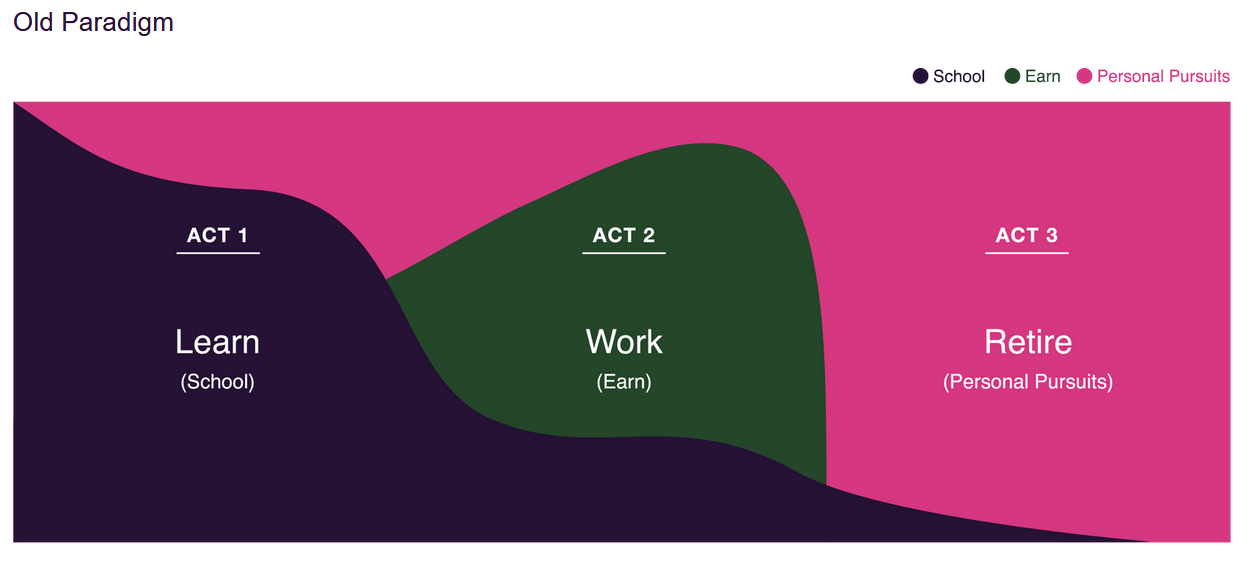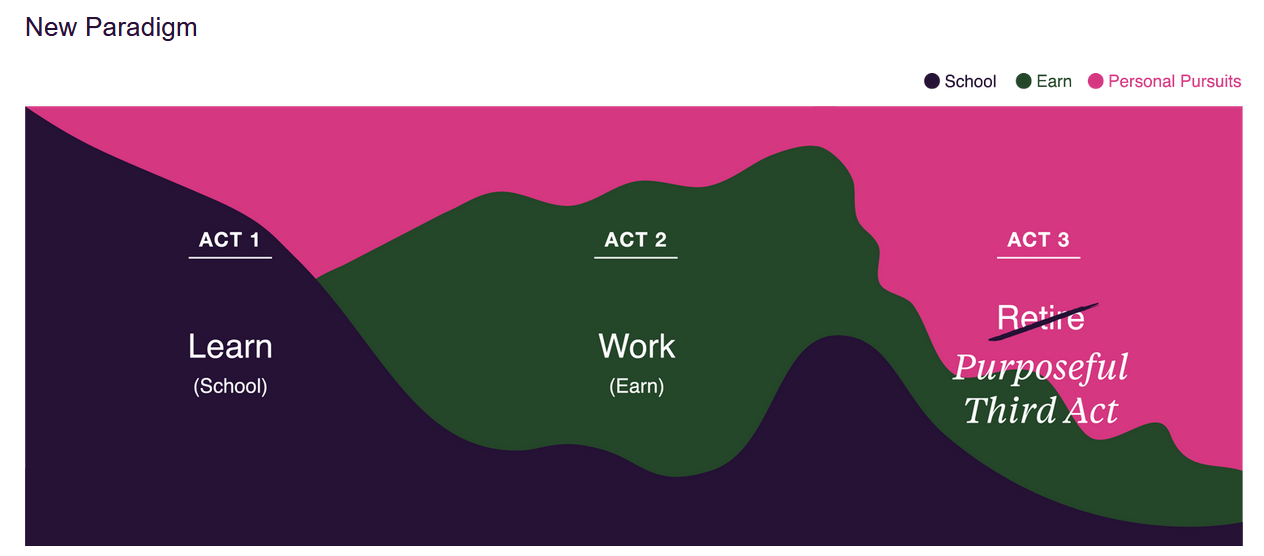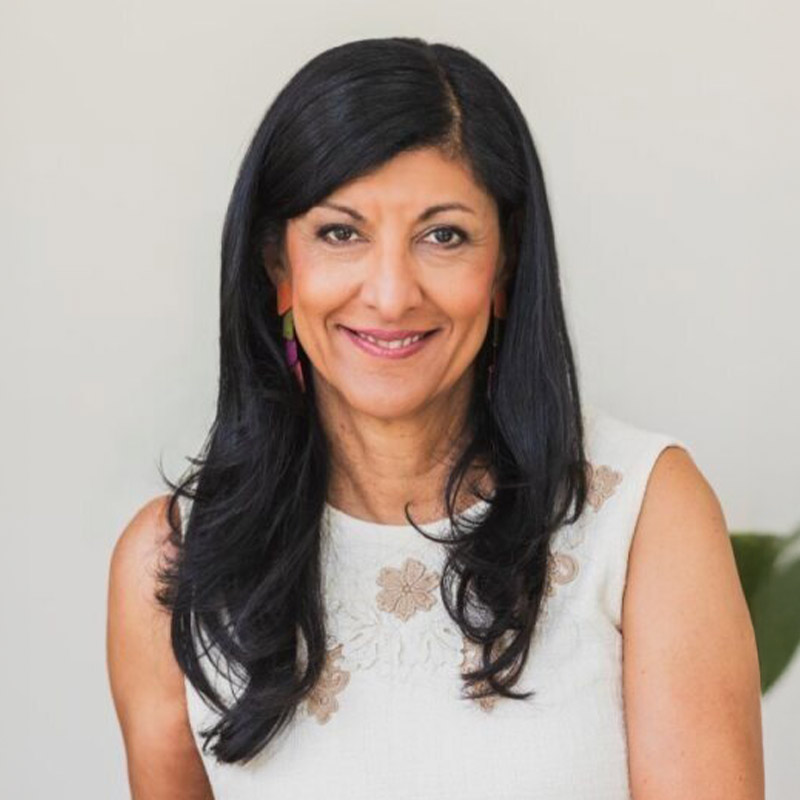
Global Peter Drucker Forum
Purposeful Third Acts: The wisdom economy needs more hands on deck
by Zabeen Hirji Published September 19, 2025 in Global Peter Drucker Forum • 8 min read
This article is part of our series by authors speaking at the 17th Global Peter Drucker Forum on Next Era Leadership held in Vienna, Austria on 6–7 November 2025.
We’re living through a longevity revolution where, for some people, the traditional concept of retirement is becoming obsolete, says Zabeen Hirji.
Seven years ago, I faced a question that haunts many accomplished executives: “Now what?” At 57, and after four decades at RBC, culminating in a decade overseeing 80,000 employees across 40 countries as Chief Human Resources Officer, I had “retired”. Virtually overnight, I had lost much of my career-defined identity and status. After decades built on disciplined routines and an overflowing work calendar, retirement suddenly felt like stepping into an abyss.
But rather than accepting the traditional narrative of retirement as decline, I decided to design what I now call a Purposeful Third Act – a framework for meaningful engagement guided by impact, learning, and joy. Today, this approach has become the foundation for a movement I’ll be discussing at the Global Peter Drucker Forum in Vienna this November, where leaders from around the world will explore “The Next Knowledge Work.”

Welcome to the longevity revolution
We are living through a longevity revolution. With life expectancy now reaching the mid-80s and beyond, we have the opportunity to turn the last three decades of life from a period of decline into a period of tremendous value – for individuals, for organizations – and for society.
This isn’t just about personal fulfilment. We’re entering what is now being called the wisdom economy, where experience becomes a catalyst for progress rather than a relic of the past. In a world shaped by the rapid rise of AI, shifting demographics, geopolitical tensions, climate change, and growing polarization, wisdom, the fusion of lived experience, empathy, discernment, and trusted relationships, is not optional; it is the compass that can guide us toward both ethical and enduring solutions.
The numbers tell a compelling story. If just 20% of people like us spent 20% of their time making social or environmental impact during their third act, we could have a material impact on GDP and society. Imagine the exponential power of unlocking all that leadership experience to help shape what’s next.

“Dealing with the effects of climate change, technological disruption, and geopolitical uncertainty requires the kind of seasoned judgment that only comes from having navigated multiple crises.”
We must capitalize on the latent power of decades of leadership and experience
My Peter Drucker Forum session, “Purposeful Third Acts: Mobilizing More Hands on Deck,” furthers the forum’s theme of advancing knowledge work. We’re not talking about traditional volunteering – important though that is – but about leveraging decades of strategic leadership experience to address complex societal and environmental challenges.
The pandemic taught us that sudden systemic shocks can result in two or three years of global imbalances. Dealing with the effects of climate change, technological disruption, and geopolitical uncertainty requires the kind of seasoned judgment that only comes from having navigated multiple crises. Yet we’re systematically excluding this untapped source of available wisdom from our decision-making processes through ageism and outdated notions of retirement.

Designing a Purposeful Third Act: the individual journey
Creating a meaningful third act requires intentional design, not wishful thinking. When I first contemplated my post-RBC life, I approached it like any major business initiative – with strategy, planning, resources, clear objectives, and outcome measures.
The most important step is reflection: not what do you want to do, but who you have been and who you want to be. This requires vulnerability and often professional support. For me, it meant confronting unresolved grief from losing my father suddenly when I was 11 years old – something that had shaped my career and my life without me being fully aware of its effects. You must be prepared to open that box from the past and deal with its contents.
I worked with coaches and advisors who pushed me to dream bigger and not constrain myself because I was “older” and supposed to be retired. Their biggest gift was telling me, “You are not old. You can do whatever you want to do.” This mindset shift from personal success to social significance became transformational.


Here’s my practical framework for designing your own contribution:
Start with purpose. I landed on mine – “Unlocking human potential and building inclusive prosperity.” This became my North Star, guiding every decision about which opportunities to pursue and which to decline gracefully. And while not explicitly articulated, I spent the second/latter half of my career guided by this North Star. In addition to my role as CHRO, I held responsibility for social impact and communications.
Build infrastructure. I hired a chief of staff and created an operating plan with measurable outcomes. This isn’t vanity – it’s about treating your third act as seriously as you treated your corporate role. I spend a quarter of my time on commercial activities (like my advisory roles at Deloitte and the HR Professionals Association), which keeps me in the flow of business issues, sharp and credible, and the bonus is that it funds this infrastructure.
Cultivate relationships deliberately. My vast network, built over decades of genuine engagement across sectors, now forms the foundation of my impact. Don’t just look inside your industry – engage with different sectors, segments, and communities. Do things for people because you can, not because you expect direct returns. Today, I spend half my time in pro-bono roles, advising leaders across governments, universities, and not-for-profits.
Plan for 20+ years, not five. My early assumption that this would last five years was completely wrong. With purpose and good health, your third act could span two decades or more. Plan accordingly.
Embrace freedom. The personal and professional freedom that comes with independence is extraordinary. I can say whatever I want without worrying about alignment with corporate positions. This freedom to “tell it how it is” becomes a powerful asset in advisory relationships. For example, this is particularly valuable in my pro-bono role as Special Advisor to the Clerk of the Privy Council (Head of the Canadian Public Service).
Purposeful Third Acts aren’t a one-size-fits-all design; see examples of leaders making their own unique contributions.

What organizations can do to embrace the wisdom dividend
Organizations have a tremendous opportunity – and I would argue, responsibility – to support their executives and professionals in building and enacting Purposeful Third Acts. This isn’t just altruism; it’s a strategic advantage.
Consider the business case: when I’m out in the community, showing up with purpose and values aligned to RBC’s, the bank still receives a halo effect from my work, even though they don’t have a formal program supporting this transition. Imagine if they did. Organizations could create systematic approaches to help departing leaders design their next chapters while reinforcing mutually beneficial relationships.
Here’s what forward-thinking organizations should implement:
Pre-retirement transition programs. Just as companies support all employees during restructuring, they should offer six to 12-month programs helping executives and professionals design their Purposeful Third Acts. This includes personal coaching around things like identity and ego reset, strategic planning, and network activation.
Alumni engagement strategies. Create formal mechanisms for former leaders and professionals to remain connected and contribute expertise to current challenges. This could include advisory panels, mentoring programs, or serving on special project committees.
Challenge ageism systematically. It’s ironic that many organizations led by CEOs in their 60s still harbor biases against older workers. We need to shift from viewing age as decline to recognizing it as accumulated value. This requires both mindset change and concrete policy adjustments.
Support flexible working. Recognize that former leaders may want to contribute without full-time commitment. Offer part-time consulting arrangements, seasonal project work, or “on-call” expertise that can be activated when specific challenges arise.
Companies implementing the following two actions may explore the possibility of doing so in partnership with governments or not-for-profits.
- Expertise matching platforms. Create country-wide and local mechanisms to connect third-act professionals with organizations that need their expertise, particularly in the not-for-profit and public sectors. Throw the net widely – remote working can connect businesses with skills across the country.
- Training and infrastructure support. Fund programs – for example, in skills development – that help professionals transition into Purposeful Third Acts. Support the development of not-for-profit “back office” services that can help third-act professionals manage their complex, multi-sector engagements and other administration. The benefit for the organizations is brand and reputation building with alumni ambassadors in the community.
Intergenerational learning. Promote reciprocal mentoring and intergenerational teams, with younger employees teaching digital and AI fluency, and innovative problem-solving, while gaining wisdom, and developing emotional intelligence and judgment. This continuous exchange sharpens human skills such as empathy, discernment, and influence for the next generations, while keeping experienced professionals adaptable through exposure to fresh thinking, new technologies, and evolving ways of working.
Invest in the pipeline. Support current leaders in developing the relationships and external perspectives that will serve them well as they eventually step into their own third acts.
Governments have a crucial role in creating an enabling environment for the Purposeful Third Act.
Government’s role: policy to enable the Purposeful Third Act
Governments have a crucial role in creating an enabling environment for the Purposeful Third Act. The potential economic and social benefits, combined with healthcare cost savings from more engaged older populations, make this a compelling policy priority area.
Speaking from my experience in Canada, the major contribution from government is tax policy reform.
They should consider allowing deductions for expenses related to pro-bono professional work. Examine pension clawback policies that discourage productive engagement. Create tax-efficient structures for the kind of portfolio careers that characterize many third acts.
Navigating the loss of identity that comes with leaving formal roles is hard.
From individual progress to building a movement
The longevity revolution is happening whether we plan for it or not. The question is whether we’ll harness this unprecedented accumulation of experience and wisdom, or let it sit on the sidelines while we face increasingly complex global challenges that demand the perspective of leaders who have weathered multiple crises and learned what works through decades of real-world experience.
At the Peter Drucker Forum, I plan to explore how we can scale this individual Purposeful Third Act transformation into a broader movement. We need more hands on deck – experienced hands that can provide the steady influence our volatile world desperately needs.
Leading without a title isn’t easy. Navigating the loss of identity that comes with leaving formal roles is hard. But as I’ve learned over seven years of living my own Purposeful Third Act, the rewards – in terms of impact, learning, and joy – far exceed the challenges.
The question is: will we seize this unprecedented opportunity?
Zabeen Hirji will speak at the Global Peter Drucker Forum in November 2025.
Authors

Zabeen Hirji
Strategic advisor and thought leader on leadership
Zabeen Hirji is a strategic advisor and thought leader on leadership, purpose, and the future of work. Former CHRO at RBC, she now leads the Purposeful Third Act movement, inspiring leaders to make meaningful impact beyond their primary careers.
She serves as Executive Advisor at Deloitte, Executive–in–Residence at SFU’s Business School, and sits on several boards. A LinkedIn Top Voice, her contributions have earned her multiple awards, including a Canadian HR Awards Lifetime Achievement Award and the Governor General’s Meritorious Medal for Diversity and Inclusion.